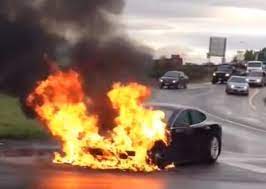Boston Firefighters Train for Electric Vehicle Fires
Electric cars may be our future, but their batteries are today’s problem for firefighters in Boston. Fortunately, the City of Boston’s fire department is preparing and training for fires involving these little-understood, yet commonplace, batteries.
A growing concern
As the recent Tesla crash in Houston revealed, electric vehicle’s (EV) lithium ion battery fires require lengthy and complicated emergency responses. Subduing the Houston car fire required more than four hours, about 30,000 gallons of water, and advice from Tesla. The same fire in a gas-powered car would have taken minutes to put out.
In response to this growing concern, the City of Boston firefighting department has added a lithium ion (Li-Ion) storage unit in its Boston Harbor training site. The battery will be used as a backup energy source and for hands-on instruction.
The fire department is also evaluating contingency plans for EV fires within the Boston Harbor tunnel, and advising hospitals and medical communities to place the Li-Ion electric generators outside, ground level and in the open, where they are easily accessible to fire trucks and fire hydrants.
Unfortunately, Li-Ion battery fires may become more common as the technology expands into commercial buildings and beyond.
Big or small — Lithium ion batteries are everywhere.
Deputy Chief Martin McCormack explains, “A Tesla (battery) is the same technology as the big battery storage units appearing in cities and next to wind farms.” The same Li-Ion technology, which looks like a AA battery, is used in our laptops, cell phones, electric vehicles, and in the medical and healthcare industries.
McCormack, who is involved in the city’s research, says Li-Ion battery technology is “very good when it works, but when it doesn’t, it is a hell of thing to put out. This lithium ion, when it burns, it changes into something else.”
What’s the problem with Li-Ion batteries?
- Doused batteries tend to reignite – It is common for a damaged battery to hold stored energy, which can burst back into flames, given the wrong conditions.
- High-voltage, connected batteries can shock handlers.
- Water can’t reach a burning battery pack tucked inside a compartment. Instead, the battery must be cooled to prevent reignition.
- The chemical composition of Li-Ion batteries actually creates more oxygen. The batteries consist of an organic solvent and inorganic salt, according to the International Association of Fire Safety Science. The flammable electrolyte is unstable once compromised and has “poor thermal stability even at moderate temperatures (60-85 degrees Celsius),” as reported by website Carbuzz.
- Guidance by manufacturers is spotty. Although General Motors, Nissan, and Tesla have published emergency response guides, the National Transportation Safety Board (NTSB) reports most manufacturer guides lack vehicle-specific details on suppressing fires.
How can Li-Ion battery fires be put out?
McCormack says the only solution is the best-known one – water and lots of it. And once you’re done suppressing the battery with water, spray some more. Luckily, Boston has a great hydrant system, he explained.
Another method, recommended by the NTSB, includes pulling damaged batteries from the vehicle and submerging them in a saltwater bath to discharge energy.
Fighting jets of molten metal
McCormack recently watched a live test fire in Ohio of a burning Li-Ion battery next to a house. “You would not believe the sounds it makes.” The demo shot out jets of molten metal. This new energy source, he urges, needs respect and research, “I love the technology. We just have to figure out how to put it out.”
The Hundred Club — Serving the Community
Caring, serving, and protecting all of us who live in communities throughout Boston is the motto of every police officer patrolling our streets and every firefighter responding to emergencies. At The Hundred Club of Mass., we care for those who care for us. When these everyday people-turned-heroes lose their lives in the line of duty, we are here for their families.
When a police officer or firefighter dies, in many cases, their paycheck and insurance stop before their death benefits begin, which is where the Hundred Club steps in to help. Your generosity provides immediate support to the families of these everyday heroes; funds they can rely upon to pay rent, groceries, and other bills. Help us continue the tradition of caring for those who care for us. Donate to the Survivor’s Fund: https://100clubmass.org/donate/

